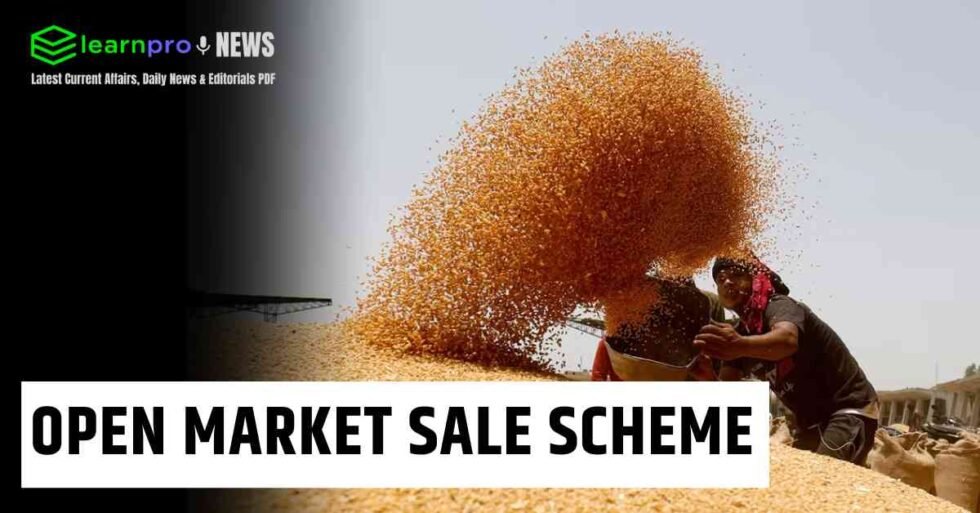
On January 17, 2025, the Union Minister of Consumer Affairs, Food and Public Distribution, Shri Pralhad Joshi, announced a revised Open Market Sale Scheme (Domestic) [OMSS(D)] Policy for 2024-25. This significant revision aligns with the Government of India’s goals of ensuring food security, supporting state-level welfare programs, and promoting ethanol production under its energy strategy. The new policy introduces fixed reserve prices for rice, streamlining the distribution process for key stakeholders while addressing national energy needs.
Key Features of the Revised OMSS(D) Policy
1. Fixation of Reserve Price for Rice
- The reserve price for rice has been fixed at ₹2,250 per quintal across India.
- This price is applicable for sales to:
- State Governments and their corporations.
- Community Kitchens running under welfare schemes.
- A significant policy change is that these stakeholders can procure rice without participating in e-auctions, simplifying the process.
2. Support for Ethanol Production
- The reserve price for rice sold to ethanol distilleries is also fixed at ₹2,250 per quintal.
- This move is part of India’s commitment to increasing ethanol production, a critical component of the national biofuel strategy.
- Ethanol production contributes to reducing dependence on fossil fuels and supports sustainable energy initiatives.
Objectives of the Policy
The revised OMSS(D) Policy is driven by the following objectives:
- Enhancing Food Security: Ensuring the availability of rice at affordable rates to state governments and organizations running welfare schemes, ultimately benefiting citizens in need.
- Simplifying Procurement: By removing the need for e-auctions for state entities, the policy facilitates a smoother and more efficient distribution process.
- Promoting Renewable Energy: Boosting ethanol production supports India’s ethanol blending program, which aims to achieve a 20% ethanol blend in petrol by 2025-26.
- Strengthening State Welfare Schemes: States can now procure rice at competitive rates, enabling them to better execute food-related welfare programs.
Implications of the Policy
1. Impact on Food Security
- The fixed reserve price ensures uniform accessibility to rice across states, empowering them to meet their obligations under various welfare schemes such as mid-day meals and community kitchens.
- This policy supports states in maintaining steady supplies of food grains for their citizens.
2. Boost to Ethanol Production
- With ethanol distilleries having access to rice at the same reserve price, this initiative bolsters the production of ethanol, contributing to the National Bio-Energy Program.
- Increased ethanol availability reduces dependence on imports of fossil fuels, aligning with India’s energy security goals and commitments to environmental sustainability.
3. Simplified Distribution Process
- By eliminating e-auctions for state agencies, the government has minimized procedural delays and ensured that critical welfare schemes are not hindered by procurement challenges.
4. Economic and Environmental Benefits
- Economic Benefits: Reduced fuel imports and enhanced state-level welfare initiatives contribute to the overall economic stability of the country.
- Environmental Benefits: Ethanol blending significantly lowers greenhouse gas emissions, contributing to India’s global climate commitments.
The Role of Ethanol in India’s Energy Strategy
1. Ethanol Blending Program
- India aims to achieve a 20% ethanol blend in petrol by 2025-26, a target that demands a steady supply of ethanol.
- Ethanol is a renewable fuel that reduces reliance on non-renewable energy sources and promotes sustainable development.
2. Benefits of Ethanol Production
- Environmental Sustainability: Ethanol blending reduces harmful emissions from vehicles.
- Energy Security: Locally produced ethanol decreases the dependence on imported oil.
- Support for Agriculture: By providing a market for surplus grains like rice, ethanol production helps farmers stabilize their incomes.
Recommendations for Stakeholders
1. State Governments
- Utilize the fixed reserve price to procure adequate rice stocks for welfare programs such as PDS (Public Distribution System), mid-day meals, and disaster relief efforts.
- Plan long-term procurement strategies to ensure uninterrupted food grain supply.
2. Ethanol Distilleries
- Leverage the revised pricing to boost ethanol production and contribute to the Ethanol Blending Program targets.
- Collaborate with state agencies to ensure the smooth supply of rice for ethanol production.
3. Industry and Agricultural Bodies
- Encourage partnerships between private entities and government agencies to streamline the implementation of the revised policy.
- Advocate for increased awareness and adoption of ethanol as a viable alternative to traditional fuels.
Conclusion
The revised Open Market Sale Scheme (Domestic) Policy for 2024-25 reflects the government’s commitment to food security, renewable energy, and the efficient execution of welfare programs. By fixing a uniform reserve price for rice and streamlining procurement processes, the policy ensures that states and ethanol producers have equitable access to essential resources. This initiative not only strengthens the foundation of India’s welfare schemes but also aligns with its broader vision of achieving energy sustainability and economic growth. The success of this policy will depend on proactive engagement from states, ethanol distilleries, and other stakeholders in leveraging its benefits for national development.
Also Read:
- Millennium Development Goals (MDGs): A Comprehensive Analysis
- Multidimensional Poverty Index (MPI) – Economy Notes for UPSC 2025
- Sustainable Development Goals (SDGs): Relevance in UPSC Mains and Prelims
- India’s Energy Security: Challenges and Opportunities
- India’s Urbanization: Challenges and Opportunities
- Water Security in India: Challenges and Solutions
- Agricultural Challenges and Opportunities in India
- India’s Infrastructure Development: Challenges and Opportunities
- Digital Transformation in India: Challenges and Opportunities
- Sustainable Development Goals (SDGs): A Comprehensive Analysis 2025
- 2030 Agenda for Sustainable Development: A Comprehensive Analysis
Useful Links:





